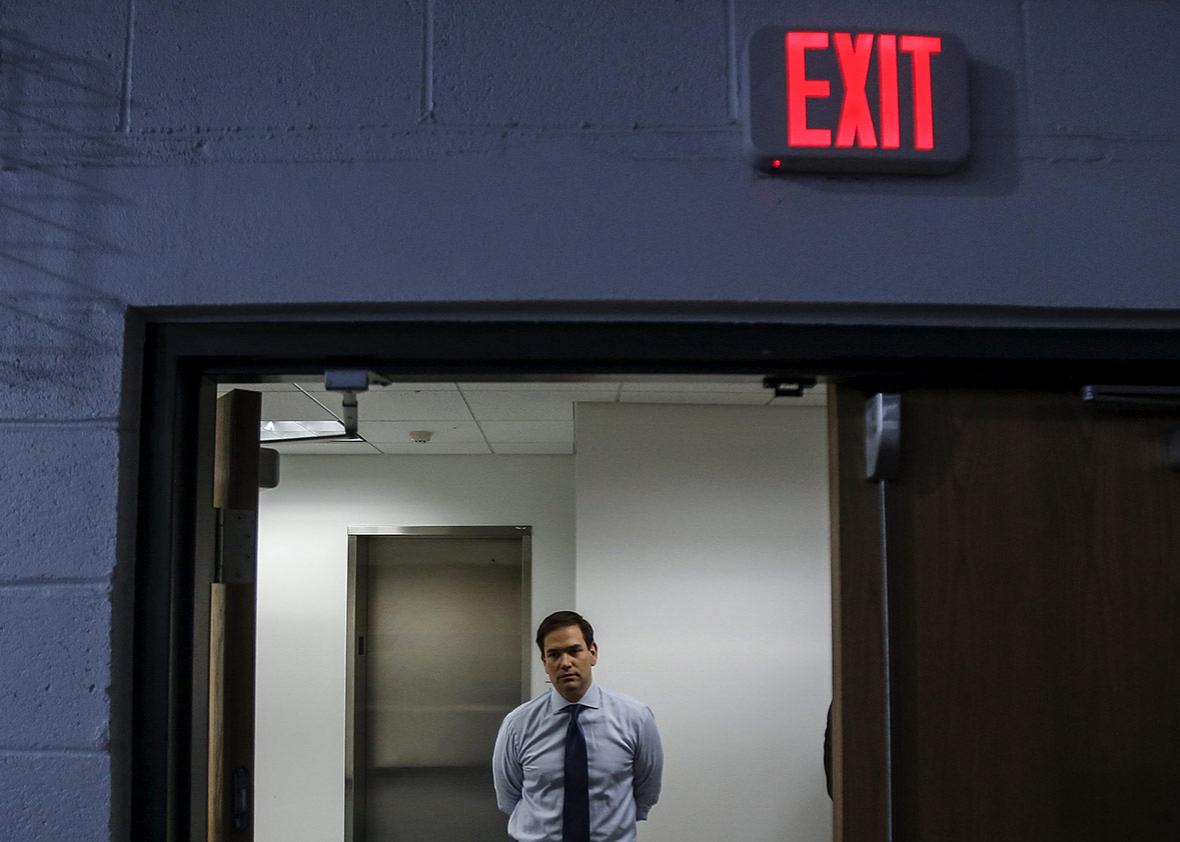Update, 8:38 p.m.: Marco Rubio suspended his campaign in an speech shortly after Florida was called.
Sen. Marco Rubio has lost the Florida primary and its 99 delegates to Donald Trump, according to the Associated Press. It wasn’t even close. This was the least surprising result of any major contest held this cycle in either party. Trump held the lead in Florida in all 39 polls of the state going back to the beginning of August, according to RealClearPolitics. It didn’t matter if there were 17 candidates in the field or four candidates in the field; whether Jeb Bush was splitting the state’s favorite-son vote with Rubio; whether Cruz was hot or cold. Trump was always the clear favorite to win, earning a double-digit margin in 29 of those 39 polls.
And yet Florida was largely treated in the media as a tossup between Trump and Rubio, for two main reasons. The first is that the Florida primary is a critical primary, by nature of its 99 delegates and the opportunity it affords Trump to put the race away, and we monsters in the media like to treat important events as unpredictable to maintain audience interest. The second is that the Rubio campaign has been promising that it would win Florida, all public evidence aside. Mass pollster failure is something that can and does happen, as it did across the map in the 2014 midterm elections or just last week in the Michigan Democratic primary. Perhaps the Rubio campaign, with its granular knowledge of the Florida Republican electorate, was privy to some exclusive data that told a different story.
That was the argument the Rubio campaign was making in public. On Feb. 25, when the first Florida poll since January was released showing Trump with a 44-percent-to-28-percent advantage over the Florida senator, Rubio adviser Todd Harris tweeted the following:
There wasn’t much ambiguity there—though, as one replier tweeted back, “you guys consider 2nd and 3rd place to be victories, so you are probably right.”
But Rubio himself had been projecting similar confidence, not bothering with the usual head games about how a second- or third-place finish would secretly be a massive victory. “We have to win here in Florida,” he said at a rally in Hialeah last week. “It was always going to come down to Florida, this state is always in the middle of every political fight, and it will be again.” And at an event in Ponte Vedra Beach last Thursday, he said, “I believe with all my heart that the winner of the Florida primary next Tuesday will be the nominee of the Republican Party.”
It’s important to decipher the signals that candidates and their staffs send ahead of contests that all public information suggests they’ll lose, if only as a way of gauging the campaign’s intentions. The choice is between lowering expectations or projecting confidence. Lowering expectations—saying you’ll be satisfied with a second or third or “strong fourth” or whatever other nonsense is available—means that you’ll continue after losing. Projecting confidence—saying that you will win, despite all evidence to the contrary—signals a last stand.
Rubio’s loss in Florida, according to all signals his campaign has been sending in addition to the overwhelming delegate evidence, means that his bid for the presidency has failed. When a candidate’s bid for the presidency has failed, that usually means that the candidate drops out.
But this cycle is different, as you may have noticed. The goal now is to prevent a certain fraudulent orange anger Muppet from winning the nomination. Opinions vary on the proper path going forward: Should every candidate stay in the race to continue siphoning delegates from Trump where they can, or should Rubio and Kasich coalesce around Cruz? Since the former allows for Rubio to stay in the race indefinitely even after losing his home state, he and his team might be partial to that path, assuming the money is still there. But if they want the rest of the campaign to look like something more noble than a spoiler initiative, they’re going to have to row back a lot of overconfident talk.
This post has been updated.
